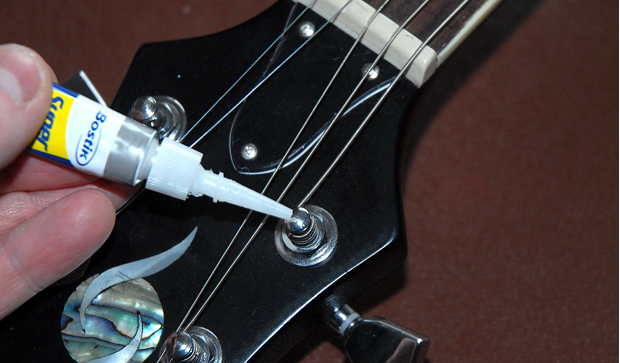Some Crazy Stories from My Repair-Shop Days

I thought I’d use this week's post to tell you about some silly episodes that prove that we don’t all know what we’re doing.
I worked in a music store in Glasgow, Scotland, for almost 20 years. Anyone who has ever worked in that kind of environment will tell you they’ve seen some pretty weird stuff. Factor in that I was the guitar-repair guy, and the potential for weirdness rockets into the stratosphere.
Here's exhibit A to kick things off:
There was the young guy with a silver-sparkle Charvel—a Model 375, if I remember correctly. Anyway, bored with his guitar’s finish, he decides to strip it off. He dips the guitar in a vat of paint stripper before thinking, "Oh, maybe I should have taken the hardware and pickups off first."
By the time I saw it, all of the guitar’s plastic bits had melted and the black hardware was way past its best.
B. Fella brings in a guitar he’s put together himself. It looks good. He tells me he’s wired up all the components correctly but the guitar doesn’t work. I take a look inside the control cavity and all the wires and capacitors are indeed connected in the right places ... with Plasticine modeling clay and sticky tape. There’s not a drop of solder in sight.
C. Fed up that his guitar was going out of tune—probably needed to stretch the strings—a novice player comes up with a genius idea. He gets the guitar in tune then coats each machine head with Superglue. If it can’t move, it can’t go out of tune, right? Then he broke a string. Er ... (See the main photo at the top of this post.)
All the latest guitar news, interviews, lessons, reviews, deals and more, direct to your inbox!
D. Angry customer approaches one Saturday morning with a Squier Stratocaster he bought the previous week. "It’s not working," he barks. I take a look and spot the problem immediately. He’s only gone and fitted his new guitar with a set of classical strings.
He tied huge knots in the end of each string to stop them slipping through the vibrato. That should have been his first clue. Electric guitars don’t cope too well with plastic strings, I tell him. He stops shouting.
E. This one is terrifying. Man is buying a guitar cable. He says it’s for his daughter, who has just got her first electric guitar. He’s about to leave when he says, "So, I just snip the end off one end of the lead and fit a wall socket, then?"
"No!" I replied. He thought that the guitar was plugged directly into a wall socket. Imagine that! His daughter could have been fried. I explained the whole concept of electric guitars and sold him a practice amp. Disaster averted, I hope.
I’ve got countless more stories like this. The young lad staying up for hours the previous night trying to screw the vibrato arm into his Stratocaster’s jack socket is just another one.
The message is, if you’re not sure what you’re doing, get some advice first. There’s no shame in admitting you don’t know something. If you’re one of those guitarists that has been round the block and knows a thing or two, share it with those less experienced.
That’s exactly what I’ll be doing next time when I’ll be looking at the problems that can be caused by top nuts. See you then!
Ed Mitchell was Reviews Editor on Total Guitar magazine from 2003, and his guitar-modding column, Ed’s Shed, appeared in print on both sides of the Atlantic (in both Total Guitar and Guitar World magazines). He was the Editor of The Blues Magazine from 2012-16, and a contributor to Guitarist, Classic Rock and Louder. He died in October 2022, aged 52. Between them, the websites Guitar World, Louder and MusicRadar host over 400 of his articles – among them interviews with Billy Gibbons, Paul Weller, Brian Setzer, profiles on Roy Buchanan, Duane Allman and Peter Green, a joint interview with Jimmy Page and Jack White, and dozens of guitar reviews – and that’s just the ones that made it online.

